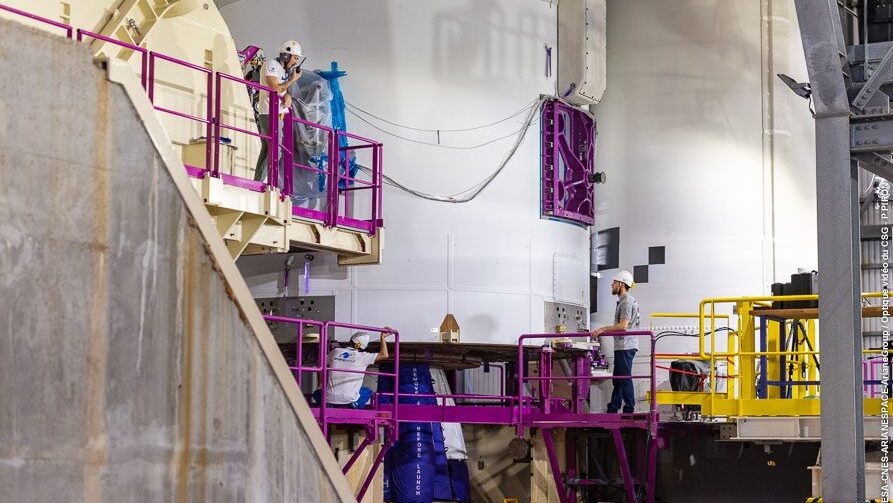
The first Ariane 6 rocket to take flight is being pieced together at Europe Space Port in in Kourou, French Guiana.
Photo: @ESA_transport on X, 30 April 2024
German Vice Chancellor Robert Habeck stirred up controversy this week following revelations that he beseeched the European Commission to scrap plans for a new satellite system just months before its official launch.
Believing that his own national space industry was being excluded, Habeck wrote a stern letter in relation to the European Union’s planned “Infrastructure for Resilience, Interconnectivity, and Security by Satellite” (IRIS2) project, marketed as a European alternative to Elon Musk’s Starlink system and a key stepping stone for Brussels’ ‘strategic autonomy’ from the U.S., China, and Russia.
Initiated by member states in 2022 and consisting of up to 170 low-Earth satellites, IRIS2 is expected to become fully operational in 2027. It is designed for both commercial and military use, amid fears that Europe is being outpaced by both the private sector and rival powers in a fast-emerging new space race. EU member states are forced to rely on Elon Musk’s Starlink during the current conflict in Ukraine.
IRIS2 is a €12 billion joint initiative of the EU’s two space agencies, the European Space Agency and the EU Agency for the Space Programme (EUSPA). It aims to create means for military and intelligence agencies to communicate securely.
In his letter, Habeck complains that France is taking the lion’s share of the contracts for the work. One anonymous EU official downplayed claims that ‘industrial lobbying’ was rigging the tendering process to benefit Paris.
The official went on to describe Habeck’s letter as “pure lobbying tactics,” with aerospace companies such as Airbus, France’s Thales, and Germany’s OHB all battling over who receives contracts.
Forging a path to the stars has long been a French goal within the EU. IRIS2 is a specific pet project of France’s Internal Market Commissioner Thierry Breton, who last week raised the prospect of Eurocrats writing new space legislation for after June’s elections. Haven’t they got enough regulatory power on Earth?
Despite Brussels’ ambitions, the EU has been plagued by logistical problems in space, including delays to its Ariane 6 rocket programme and its previous reliance on Russia made impossible by sanctions.
If successfully launched, IRIS2 will provide a key pillar for European governments in the field of intelligence and disaster management operations, able to carry military payloads, according to Breton himself, who openly acknowledges the military aims of the satellite system.
